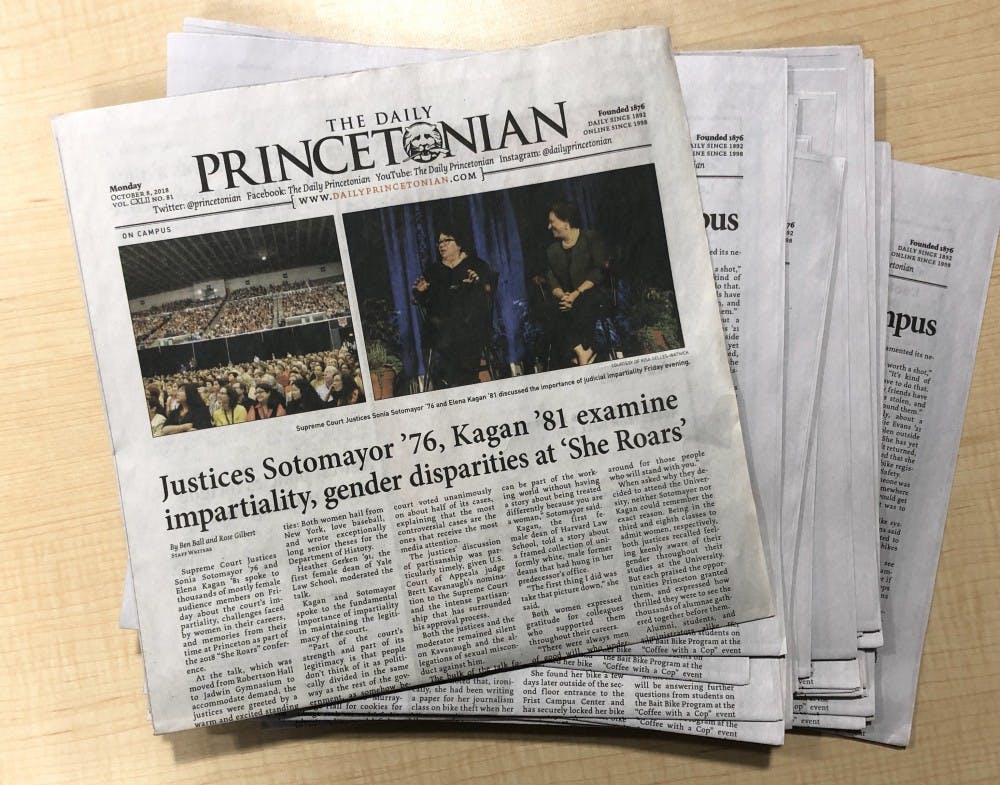I remember when I was at The Daily Princetonian’s pickups party a couple of months ago. There was tangible cheerfulness in the air; after all, everyone was excited to become a part of this grand organization — that is, until the editor-in-chief announced to us that journalism was not something that should be taken lightheartedly.
A construction worker had died onsite the previous day; in the same week, a professor had been dismissed for sexual misconduct. The ‘Prince’ was the leading, if not the only, source that had reported on such developments on campus — and we were now part of that same organization.
As someone who had never been a part of a student newspaper before, that night was memorable not because I had a great time on the Street but because of that moment. It made me truly appreciate the role journalism, and particularly the ‘Prince,’ plays in facilitating awareness of our surrounding environment.
At the same time, my previous lack of knowledge about those events signals something about the people who have access to articles from the ‘Prince.’ While many professors, local residents, and a certain sect of the student body subscribe, that is not the case for a lot of students on campus. Many know that it exists and read selected, attention-grabbing articles, but rarely do I find people who regularly read the school newspaper.
Although it may seem a little ironic that I am writing about how we should read the ‘Prince’ on the ‘Prince,’ to whomever is reading this, I want to say that it’s not too late. We should all encourage each other to read the ‘Prince’ more, particularly those who have never read it. Share articles via Facebook Messenger, WhatsApp, GroupMe, etc.; comment on news articles; and invite people to like our Facebook page.
I do know that I have the risk of sounding as if I am shamelessly plugging an organization that I am a part of, similar to those massive waves of promotional emails students receive at the beginning of the year. But I promise this is not the case. This just happens to be the forum I am writing on — but there is value in reading the ‘Prince’ beyond my own columns.
Reading about events that happened on campus, whether they are positive or negative, could play a significant role in fostering a sense of community. The communities that currently exist on campus are definitely healthy and prevalent, but they tend to be fragmented along eating club or other organizational lines; there is seldom inter-community interaction.
If everyone read the school newspaper, however, there would be at least some sense of commonality established among the campus body, or at the very least, some kind of interaction with each other in the form of campus debate over events and policies. For instance, events that happened on one side of the campus, such as Ta-Nehisi Coates’s visit, could now be communicated to the other side of campus, to those perhaps previously unaware of the writer or the on-campus organizations that were present at the event.
Furthermore, the term “Orange Bubble” gets thrown around by students — even in my very own column a few weeks back — often mocking the general atmosphere of conservatism that dominates the campus. Yet many of those students simultaneously ignore the very forum from and within which that bubble could be most potently broken. This is where the ‘Prince’ can make a critical step.
Events that I mentioned before, such as the death of a construction worker or sexual misconduct investigations, are significant issues that demand response from the University administration itself. If we, as the student body, want a certain kind of response — if any at all — from the University, then we must at least remain informed about the events shaping up this campus. Healthy discussions — and promoting effective forms of activism — simply cannot emerge if students themselves are uninformed by what is happening on campus.
If we have learned anything from taking politics classes, or simply just watching the President speak on television, it is that no authority should remain unchecked — and that includes the Undergraduate Student Government (USG) as well as the University’s administration. The issue isn’t just limited to ones mentioned above; USG holds tremendous power despite the relatively undemocratic nature of its election processes, and Princeton’s very own German department is strongly alleged to have committed rampant gender-based discrimination.
So if anything, the time is now. Stay informed and fight back. Not only can the ‘Prince’ provide a significant source of campus-wide community, but it has tremendous potential to become a critical rallying point for campus activism. So if you’re reading this, it’s not too late: Go tell your friends to read the ‘Prince.’

Jae-Kyung Sim is a first-year from Sejong City, South Korea. He can be reached at j.sim@princeton.edu.








